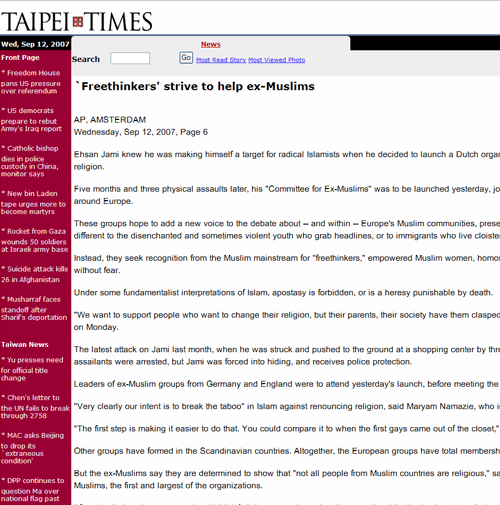‘Freethinkers’ strive to help ex-Muslims, Taipei Times
`Freethinkers’ strive to help ex-Muslims
AP, AMSTERDAM
Wednesday, Sep 12, 2007, Page 6
Ehsan Jami knew he was making himself a target for radical Islamists when he decided to launch a Dutch organization for Muslims who renounce their religion.
Five months and three physical assaults later, his “Committee for Ex-Muslims” was to be launched yesterday, joining similar groups that have sprung up around Europe.
These groups hope to add a new voice to the debate about — and within — Europe’s Muslim communities, presenting themselves as diametrically different to the disenchanted and sometimes violent youth who grab headlines, or to immigrants who live cloistered among their own.
Instead, they seek recognition from the Muslim mainstream for “freethinkers,” empowered Muslim women, homosexuals and those who want to renounce their religion without fear.
Under some fundamentalist interpretations of Islam, apostasy is forbidden, or is a heresy punishable by death.
“We want to support people who want to change their religion, but their parents, their society have them clasped in it and won’t let them out,” Jami, 22, said in an interview on Monday.
The latest attack on Jami last month, when he was struck and pushed to the ground at a shopping center by three youths, was widely publicized in the Netherlands. The assailants were arrested, but Jami was forced into hiding, and receives police protection.
Leaders of ex-Muslim groups from Germany and England were to attend yesterday’s launch, before meeting the European Commission in Brussels today.
“Very clearly our intent is to break the taboo” in Islam against renouncing religion, said Maryam Namazie, who in June founded the British Council of Ex-Muslims.
“The first step is making it easier to do that. You could compare it to when the first gays came out of the closet,” she said.
Other groups have formed in the Scandinavian countries. Altogether, the European groups have total membership of no more than several hundred.
But the ex-Muslims say they are determined to show that “not all people from Muslim countries are religious,” said Arzu Toker, vice president of Germany’s Council of Ex-Muslims, the first and largest of the organizations.
“If we don’t show it, many people will think `all these people are just the same,’ and that’s simply not true,” she said.
Toker, a Turkish-born journalist, says membership in Germany has grown to more than 100 from 18 founders in January. Hundreds more have written to show their support, but are unwilling, unable or afraid to join.
Akbar Ahmed, who chairs the Islamic Studies department at American University in Washington, said the advent of such groups is not surprising.
He said it is wrong to say Islam endorses killing apostates, though some of the Hadith , or sayings of Mohammed, appear to endorse it — when taken out of context.

